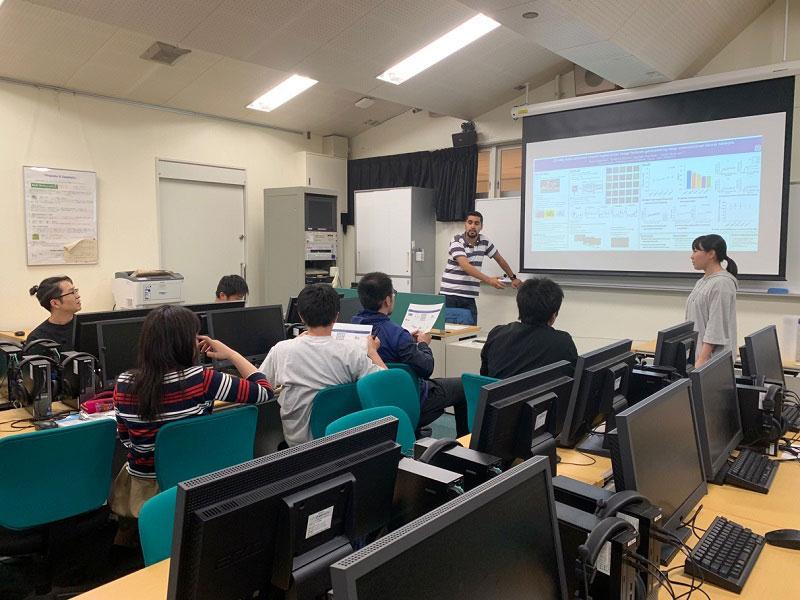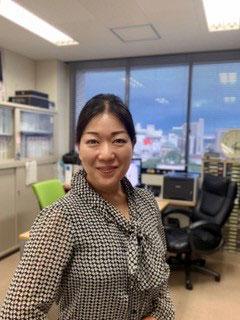March 2020 Issue
Topics
Self-regulated learning: English for students of science and engineering
Suwako Uehara
Associate Professor
Graduate School of Informatics and Engineering
Faculty of Informatics and Engineering Division of General Education
"My approach to teaching English to students majoring in science and technology is based on the so-called 'self-regulated learning,'" says Suwako Uehara, an associate professor at the Graduate School of Informatics and Engineering, Faculty of Informatics and Engineering Division of General Education, UEC Tokyo. "Amongst other things, this requires emphasizing motivation, awareness, setting goals, developing skill sets and technology for the mutual benefit of both students and their teachers. Teaching STEM students is a challenging and continuously evolving process of education."
Self-Access Park
The UEC Self-Access Park (UECSAP) was established by Uehara and her colleagues to support language learning outside of the classroom. "The UECSAP is our version of a SALC, "self-access learning center," explains Uehara. "It has been running for over five years and is managed by members of the English faculty and students. Activities include peer support on writing papers and presentations in English, organizing seminars and lectures on culture as well as giving talks on research to local high school students."

Uehara continuously assesses the degree of satisfaction of the students with the UECSAP program and shares the results at conferences and seminars. Recent results of a survey showed an above average user satisfaction for the level of support.
Uehara found that the development of the program depends on the needs of individual institutions and their stakeholders, and that it is imperative to share information about the program with relevant sections within institutes.
"The survey highlighted a need for discussion on the level of autonomy or forced autonomy each institution requires to have an active SALC," says Uehara. "More emphasis should be made on raising awareness of studies related to language learning to users, language educators, and student staff via research reports and papers. Additionally, there are benefits in organizing motivational talks by peer role models to foster autonomous learning based on internal motivation studies."
Teaching methods for graduate school technical English: English for specific purposes (ESP) and flipped learning
Uehara is also conducting research on developing methods to teach science and technology graduates how to make presentations at conferences. At UEC, Uehara and her colleagues work with faculty members specializing in science and engineering to run a 15-week course focused on teaching approximately 120 first year graduate students how to make presentations at international conferences. As part of the course, each student gives a short two-minute presentation about their undergraduate thesis in English. "This course is special because experts in English teaching and scientists and engineers work together to compliment their skill sets to motivate students to learn the art of presentations at international conferences. It's a unique course yielding encouraging results."
Surveys show that students are highly attentive with 97% attendance and 98% homework submission rate. Furthermore, questionnaires show that in the context of presentations, students want to improve their speaking strategies, level of English for writing slides, and delivery of the slides. Regarding writing, the demands are for preparing whole research manuscripts with emphasis on abstracts, grammar and style, and expressing technical terms. For reading, it is speed reading, skills to summarize papers in their own words, and critical analysis.
"We found that the vast majority of students were satisfied with the course," says Uehara. "However, the feedback showed that the more than 60% of students found it difficult to give the two-minute talk."
To circumvent the lack of time for longer talks during lectures, Uehara is planning to introduce 'flipped learning", a pedagogical approach in which classroom lectures are recorded on video for students watch for homework, and this gives more time for discussion and practical work in class. "According to studies in the field, the benefits of flipped learning include that students can take control of their learning, there is a collaboration between teachers and students, and there is an increased responsibility for both parties to make the course a success," says Uehara.
References
Uehara, S. (2019 May). Developing a self-access in a STEM University. PanSIG2019 Conference, 18-19 May 2019, Konan University, CUBE Campus, Hyogo, Japan.
Uehara, S., Terashima, S., & Shi, J. (2019 November). Needs analysis for graduate school technical English course design and materials development. The 3rd Annual Conference of Asia ESP & the 8th Chinese National Conference on ESP, 15-17 November 2019, Chongquing University China.



